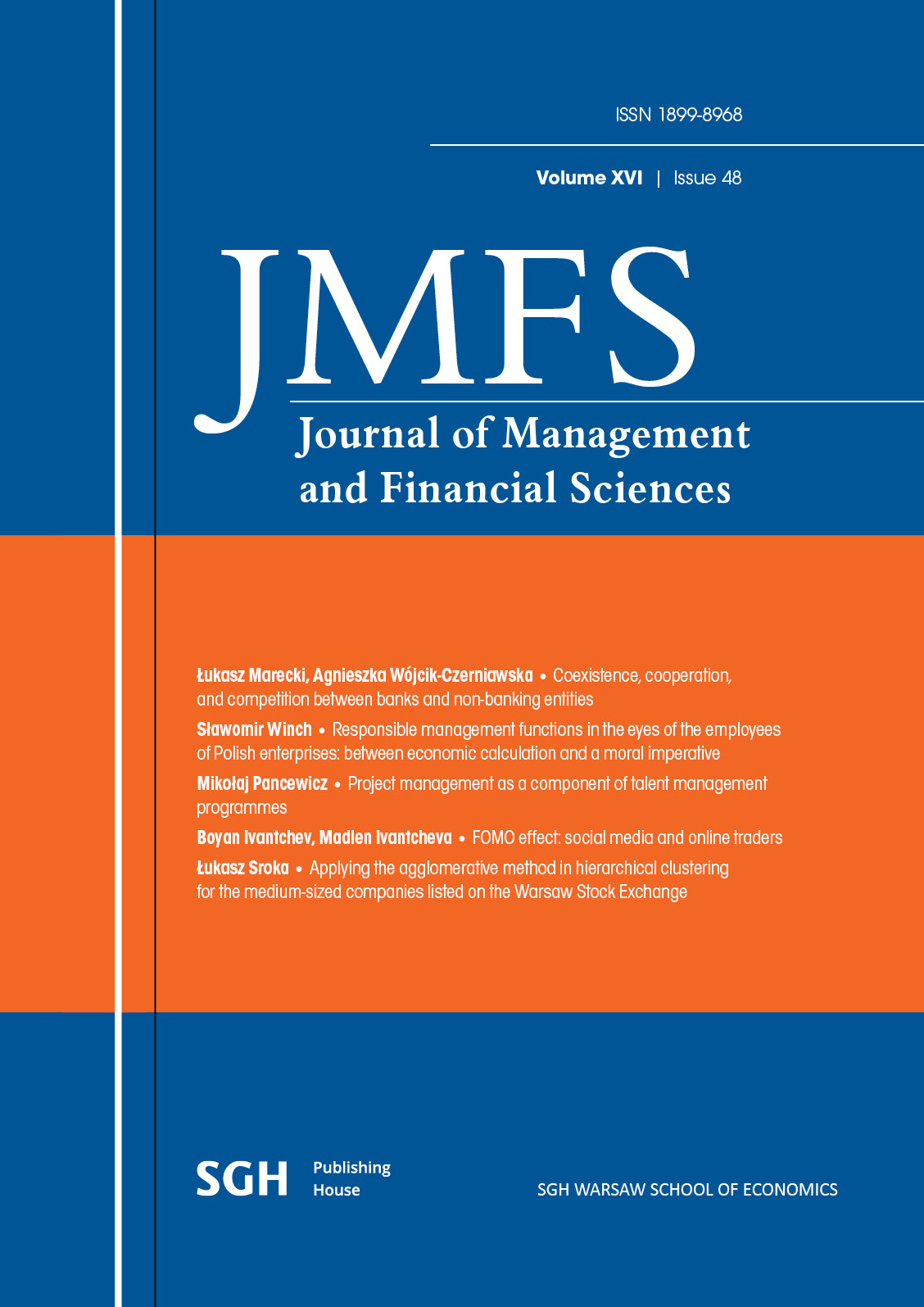Responsible management functions in the eyes of the employees of Polish enterprises: between economic calculation and a moral imperative
Main Article Content
Abstrakt
The article develops the thesis that the importance of responsible management is perceived by employees in the aspect of the company’s marketing activities. The following research problem was formulated: which of the distinguished areas of activity (relations with the company’s stakeholders, market position, revenues, and costs of the company) is most influenced by responsible management? The purpose of the article was to demonstrate what functions responsible management serves in the eyes of representatives of Polish enterprises. Quantitative research based on a standardized questionnaire was conducted based on representative samples of Polish enterprises in March 2022. On the basis of the research, it was found that marketing instruments have a greater impact on the competitive position of companies than activities in the area of responsible management. Ethical issues are perceived depending on the situational context. Responsible management is more often seen as a marketing instrument than a moral imperative to act.
Downloads
Article Details

Utwór dostępny jest na licencji Creative Commons Uznanie autorstwa 4.0 Międzynarodowe.
Bibliografia
Aczel, A. D. (1993). Complete business statistic. Boston: Irwin.
Ali Aribi, Z, Almahrog, Y., Arun, T. (2018). Earnings management and corporate social responsibility: UK evidence, Journal of Financial Reporting and Accounting, 16 (2), pp. 311–332, doi:10.1108/JFRA-11-2016-0092
Amoako, G. (2020). A conceptual framework: Corporate environmental management activities and sustainable competitive advantage. Management of Environmental Quality, 31 (2),
pp. 331–347, doi:10.1108/MEQ-09-2019–0187
Aronson, E. (1976). Człowiek istota społeczna. Warszawa: Państwowe Wydawnictwo Naukowe PWN.
Bahta, S., Bikanyi, K. J., Islam, Md.R., Yun, J. (2021). How does CSR enhance the financial performance of SMEs? The Mediating role of firm reputation. Economic Research – Ekonomska
Istraživanja, 34 (1), pp. 1428–145, doi: 0.1080/1331677X.2020.1828130
Barnett, M. L. (2007). Stakeholder influence and capacity and the variability of financial returns to corporate social responsibility. Academy of Management Review, 32 (3), pp. 794–816, doi:10.5465/amr.2007.25275520
Bowring, F. (2015). Negative and Positive Freedom: Lessons from, and to, sociology. Sociology, 49 (1), pp. 156–171, doi: 10.1177/0038038514525291
Carnegie, A. (2007). The Autobiography of Andrew Carnegie and the Gospel of Wealth. London: Penguin Putnam Inc.
Conaway, R., Laasch, O. (2016). Responsible Business: The Textbook for management learning, Competence and Innovation, London: Routledge, doi: 10.4324/9781351284325
Dąbrowska, A., Sołek-Borowska, C., Zajkowska, M. (2022), Consumer social responsibility. Unpublished research report. Warszawa: Szkoła Główna Handlowa w Warszawie.
Denis, D. J. (2018). SPSS Data Analysis for Univariate, Bivariate, and Multivariate Statistics. New Jersey: John Willey & Sons, doi:10.1002/9781119465775
Ennals, J. R. (2014). Responsible management. Berlin: Springer, doi:10.1007/978–3-642-55401–8
Ferrell, O. C., Ferrell, L. Hair, J., Harrison, D. E. (2019). Business ethics, corporate social responsibility, and brand attitudes: An exploratory study. Journal of Business Research, 95, pp. 491–501, doi: 10.1016/j.jbusres.2018.07.039. Retrieved from https://www-1sciencedirect-1com -1brp226lq0757.han.sgh.waw.pl/science/article/pii/S0148296318303588#! [accessed 20.02.2023].
Friedman, M. (2002). Capitalism and freedom. Chicago: University of Chicago Press.
Gasparski, W. (2007). Wykłady z etyki biznesu. Warszawa: WSPiZ.
Goodwin, P., White, G. (2014). Decision Analysis for Management Judgment. New Jersey: John Willey & Sons. Retrieved from https://books.google.pl/booksid=eenRAwAAQBAJ&printsec=frontcover&hl=pl&source=gbs_ge_summary_r&cad=0#v=onepage&q&f=false [accessed: 05.05.2023].
Haidt, J. (2013). The righteous mind: why good people are divided by politics and religion, London: Penguin Books.
Helmold, M. (2022). Strategic Performance Management: Achieving Long-term Competitive Advantage through Performance Excellenc. Berlin: Springer, doi:10.1007/978–3-030-98725–1
Hofstede G., Hofstede, G. J., Minkov, M. (2010). Cultures and Organizations. Software of the Mind. New York: McGraw-Hill.
Hornungová, J. (2017). Nonfinacial performance evaluation as significant area of strategic business management. Business: Theory & Practice, 18, pp. 71–78, doi:10.3846/btp.2017.008
Karyawati, G., Saraswati, E., Subroto, B., Sutrisno, T. (2020). Explaining the complexity relationship of CSR and financial performance using neo-institutional theory. Journal of Asian Business and Economic Studies, 27 (3), 227–244, doi: 10.1108/JABES-10-2019-0106. Retrieved from https://www.emerald.com/insight/content/doi/10.1108/JABES-10-2019-0106/full/html [accessed: 15.05.2023].
Keys, T., Malnight, T. W., Van der Graaf, K. (2009). Making the most corporate social responsibility, McKinsey Quarterly, 36, pp. 38–44.
Legutko, R. (2007). Traktat o wolności. Gdańsk: Słowo/Obraz/Terytoria.
Lindsay, J., Pluckrose, H. (2022). Cyniczne teorie. Warszawa: WEI.
Meyer, E., (2023). Mapa kulturowa. Kraków: Znak.
Mintzberg, H. (2022). Zarządzanie. Warszawa: Nieoczywiste.
Scruton, R. (2012). Green Philosophy: How to think seriously about the planet. London. Atlantic Books.
Maráková, V., Tučkovaá, Z., Wolak-Tuzimek, A. (2021). Corporate social responsibility as a source of competitive advantage in large enterprises. Journal of Competitiveness,13 (1), pp. 113–128, doi:10.7441/joc.2021.01.07
Martinez, C., Sasia, M., Skeet, A. G. (2021). Managing organizational ethics: How ethics becomes pervasive within organization, Business Horizons, 64 (1), 83–92, doi:10.1016/j. bushor.2020.09.008. Retrieved from https://www-1sciencedirect-1com-1brp226lq0762.han.sgh.waw.pl /science/article/pii/S0007681320301233. [accessed: 10.08.2022].
Marcinkowska, A., Mider, D. (2013). Analiza danych ilościowych dla politologów, Warszawa: Instytut Nauk Politycznych Uniwersytetu Warszawskiego.
Murray, D. (2019). The Madness of Crowds. London: Bloombsbury Publishing.
Porter, M. E. (1985). Competitive Advantage: Creating and Sustaining Superior Performance. New York. Free Press.
Skowronek-Mielczarek, A. (Ed.). (2017). Odpowiedzialne zarządzanie w małych i średnich przedsiębiorstwach. Warszawa: Szkoła Główna Handlowa w Warszawie.
Ramaswamy, V. (2023). Woke. Kulisy amerykańskiego przekrętu sprawiedliwości społecznej. Warszawa: WEI.
Skowronek-Mielczarek, A., Sołek-Borowska, C., Zajkowska, M. (2022). Responsible enterprise. Unpublished research report. Warszawa: Szkoła Główna Handlowa w Warszawie.
Tolosa, T. (2021). The Effect of Brand Image, Brand Trust and Perceived Quality on CSR. London: KS Omni Scriptum Publishing,
Verma, J. P. (2016). Application of Factor Analysis. In.: J. P Verma (Ed.), Sports research with analytical solution using SPSS (pp. 319–345). New Jersey: John Willey & Sons.
Waddock, S., Bodwell, Ch., Leigh, J. (2007). Total Management. London: Routledge, doi:10.4324/9781351280402
Winch, S. (2021). HR Business Partner. Warszawa: Szkoła Główna Handlowa w Warszawie.
Wolak-Tuzimek, A. (2019). Społeczna odpowiedzialność przedsiębiorstwa a konkurencyjność przedsiębiorstw. Warszawa: CeDeWu.
